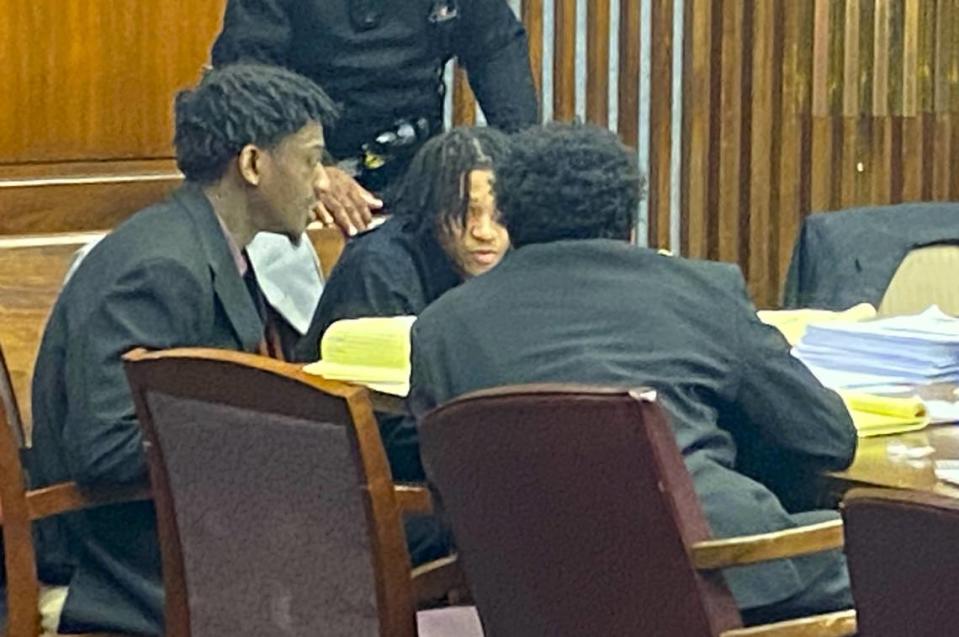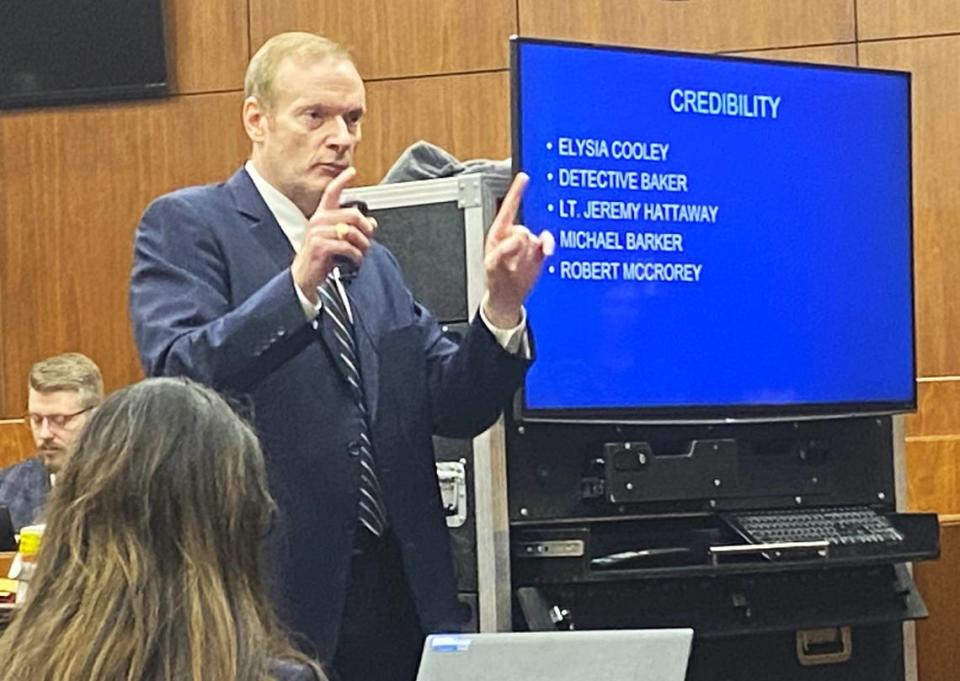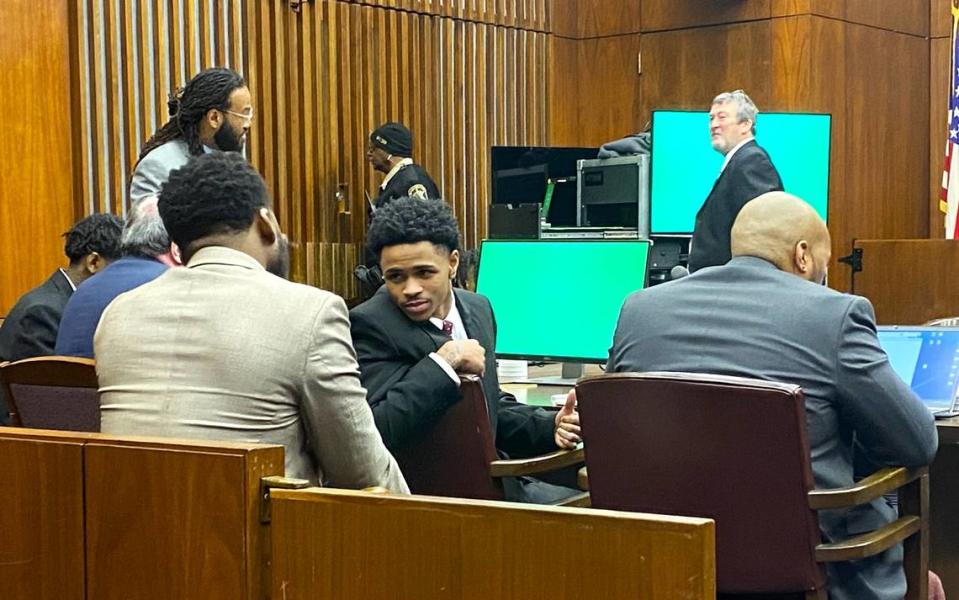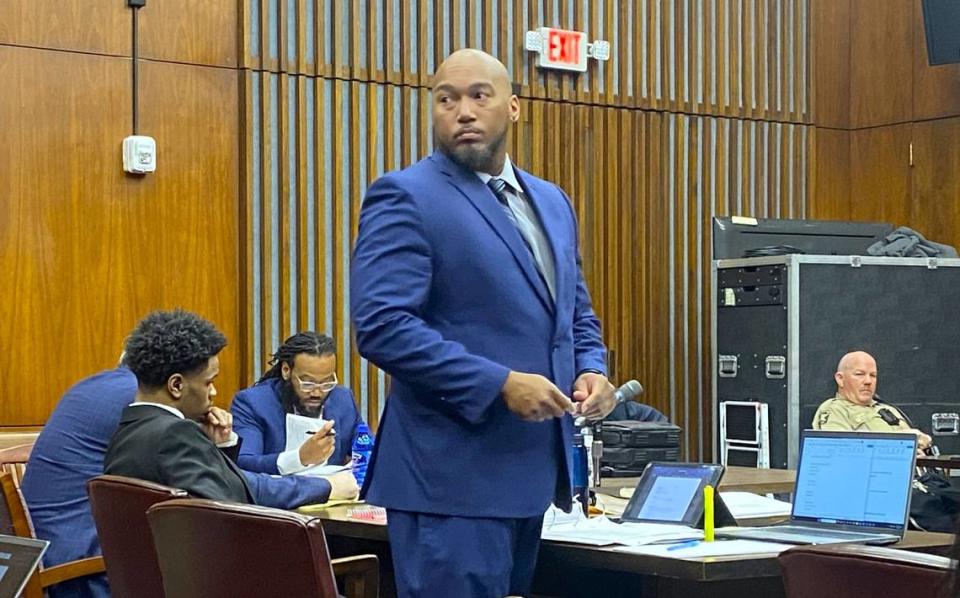Jury late Friday gives mixed verdict in Columbus ‘Insane Crips’ murder trial
A Columbus jury has delivered mixed verdicts in the multi-count murder trial of three alleged “Insane Crips” members accused of killing a fellow gang member at Columbus’ Wilson Homes apartments.
Only one suspect was found guilty of murder.
The defendants were Corey Troupe Jr., 26; Davion C. Dupas, 22; and Jahiem Rashard Davis, 21. All were charged in the June 5, 2021, fatal shooting of 21-year-old Marcel Samedi of South Carolina.
The suspects were accused of causing Samedi’s death while committing felony assault and gang violations on a “mission” for a senior gangster in a dispute with another.
Here are the jury’s verdicts:
Dupas was found guilty of felony murder, violating the state Street Gang Terrorism and Prevention Act, and first-degree criminal damage to property.
Davis was found guilty on two counts of breaking the gang law and one count each of first-degree criminal damage to property and being a convicted felon with a firearm.
Troupe was found guilty of violating the gang law and first-degree criminal damage to property.

Georgia laws online show gang violations carry up to 20 years in prison, first-degree criminal damage up to 10, and Davis’ firearm offense up to five.
Felony murder can have a life sentence, and an offender given life with parole typically serves 30 years before being eligible for release.
The jury started deliberating Thursday evening, then returned at 9 a.m. Friday and did not reach a verdict until 12 hours later. They found the trio not guilty of multiple felony counts based on gang allegations.
According to trial testimony, a 9 mm hollow-point bullet hit Samedi in the left temple during a barrage of gunfire that left a dozen shell casings outside Wilson Homes’ Building 108. His assailants left him for dead, and did not report the shooting.
Samedi’s body remained unidentified for a week.
The final arguments
Assistant Attorney General Thomas Kegley told jurors in closing arguments Thursday that a senior gangster’s ordering retaliation for disrespect prompted the shooting, illustrating “what happens when disrespect leads to the death of one of your own.”

Witnesses said they were acting under the direction of senior or “original gangster” Michael Douglas “Pop” Brown Sr., 48, a leader of the Insane Crips in the Dimonwood neighborhood.
Brown, who’s accused of gang violations in the case but has not been captured, had been taunted by Makenzie “Mac 10” Pearce, 31, an OG with the Insane Crips based at Wilson Homes, witnesses said.
Elysia “Big E” Cooley, 19, a codefendant who testified for the prosecution, said she and the suspects were dispatched twice that night in Wilson Homes, and Samedi did not return from the second outing.
Cooley said Samedi was among gang members who came here from Rock Hill, S.C., for a “C-call” or “Crips call,” a summons for the gang to gather. The event at Wilson was for Brown and Pearce to settle their dispute, but Pearce did not show up, she said.
Because the suspects were on a gang mission when Samedi died, they all are parties to the crimes committed, and share responsibility for his death, Kegley argued. “It’s as if each had a hand on the trigger and pulled when Marcel was shot,” he said.
Their indictment had more than 50 counts. Visiting Judge Richard Winegarden read 18 pages of instructions to jurors to guide their deliberations.
The trial took three weeks, including three days of jury selection, with 28 witnesses and multiple exhibits of evidence.

‘A gang case’
Shawn Hoover, a defense attorney representing Davis, argued to jurors Thursday that the attorney general’s gang prosecution unit had deluged them with a mass of information on gang culture and history, but scarcely addressed Samedi’s shooting.
“They turned a murder trial into a gang case,” Hoover said. “This case isn’t about all of the gangs in Georgia.”
No witness testified that Davis was seen with a gun the night Samedi was shot, or that Davis played any significant role in the assignment that led to Samedi’s death, he said.

Instead, witness Michael Scott “Ike-Ike” Barker testified that Davis had walked away when the gunfire began, Hoover said. He argued that Barker, who admitted firing a 9 mm handgun in the direction he heard the first shots coming from, was likely the gunman whose bullet hit Samedi.
Troupe’s attorney, William Kendrick, used the same theory, saying Barker, who was not charged in the case, was in a position to fire from Samedi’s left, which is where the fatal shot came from.
Kendrick told jurors all the charges against his client required the prosecution to prove Troupe caused Samedi’s death by firing a gun that night, and no proof was presented.
Dupas was represented by attorney Adam Deaver, who like Hoover and Kendrick told jurors Barker likely fired the shot that killed Samedi. That should invalidate all the charges, because prosecutors never alleged Barker was involved in the gang operation the charges are based on, Deaver said.
Though Cooley testified for the prosecution, she still faces multiple felonies in Samedi’s shooting. Kegley said others who were involved may face arrest later.
Cooley was indicted on the same charges as Troupe and Dupas.
Troupe, also known as “Lil Pop,” and Dupas, known as “Yungdemon Dee,” were tried on six counts of violating the state Street Gang Terrorism and Prevention Act, two counts of felony murder and one count each of aggravated assault, using a firearm to commit a felony, and first-degree criminal damage to property.
Davis, also known as “Zhg Jah,” faced eight counts of violating the Street Gang Terrorism and Prevention Act, three counts of felony murder and one count each of aggravated assault, using a firearm to commit a felony, first-degree criminal damage to property, and being a convicted felon with a firearm.

